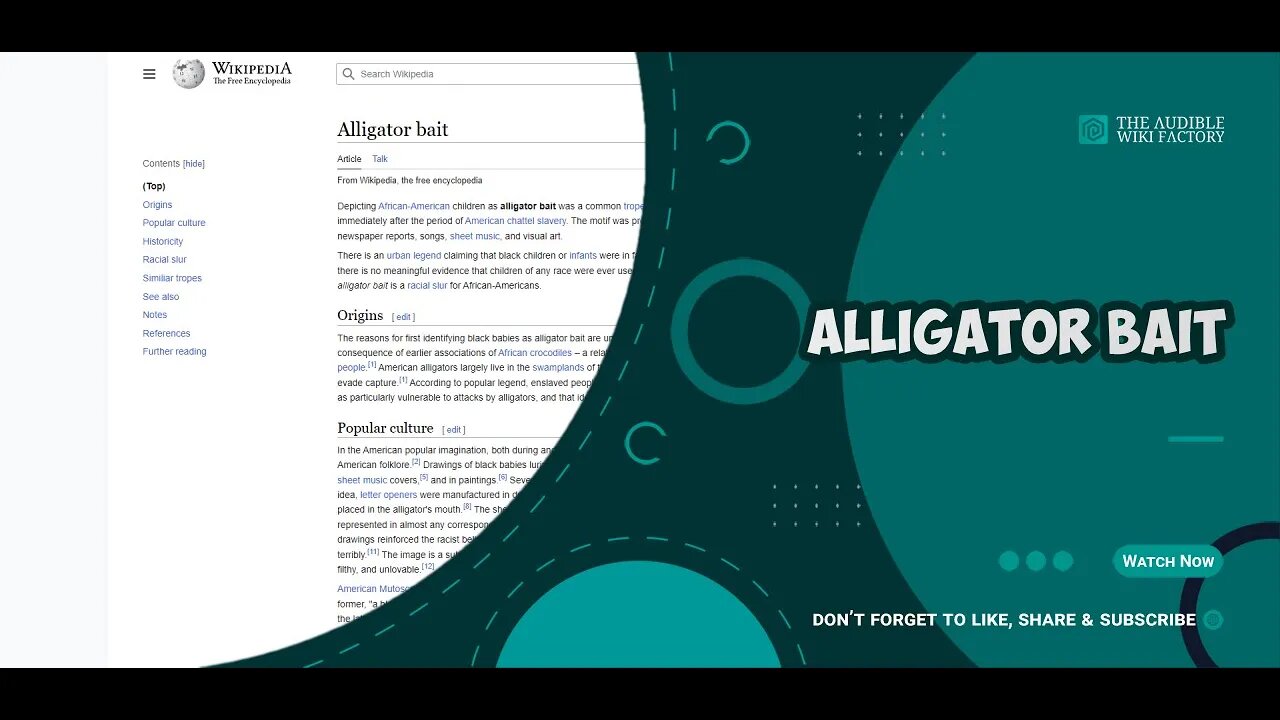Premium Only Content

Depicting African-American children as alligator bait was a common trope in American popular
Depicting African-American children as alligator bait was a common trope in American popular culture during and immediately after the period of American chattel slavery. The motif was present in a wide array of media, including newspaper reports, songs, sheet music, and visual art.
There is an urban legend claiming that black children or infants were in fact used as bait to lure alligators, although there is no meaningful evidence that children of any race were ever used for this purpose. In American slang, alligator bait is a racial slur for African-Americans.
ORIGINS
The reasons for first identifying black babies as alligator bait are unknown, but the identification may be a consequence of earlier associations of African crocodiles – a relative of American alligators – with Africa and its people. American alligators largely live in the swamplands of the Southern United States, which were one place people escaping enslavement hid to evade capture. According to popular legend, enslaved people who disappeared in swamps may have been killed by alligators; children were understood as particularly vulnerable to attacks by alligators, and that identification may have evolved into the bait image.
POPULAR CULTURE
In the American popular imagination, both during and after legal slavery, black children were commonly used as bait for alligators, an apex predator of American folklore. Drawings of black babies luring alligators were printed by companies like Underwood and Underwood on postcards, cigar boxes, sheet music covers, and in paintings. Several stories were printed in American newspapers about the alleged practice. Due to the popularity of the idea, letter openers were manufactured in designs resembling alligators, some of which came equipped with small replicas of black children's heads to be placed in the alligator's mouth. The sheet music drawings were almost purely symbolic; the images of black children being hunted by alligators were not represented in almost any corresponding music, though some songs (without the iconography) did have alligator bait as a component. In general, the drawings reinforced the racist belief that black people were victims to nature, and that their race made it reasonable to assume they should die terribly. The image is a subtype of the racist pickaninny caricature and stereotype of black children, where they were represented as almost unhuman, filthy, and unlovable.
American Mutoscope and Biograph Company produced a pair of short films in 1900 called The 'Gator and the Pickaninny and Alligator Bait. In the former, "a black man with an ax unhesitatingly attacks an alligator that has swallowed a small black boy; as a result, the boy, Jonah-like, is restored." In the latter, according to the film-company catalog, "A little colored baby is tied to a post on a tropical shore. A huge 'gator comes out of the water, and is about to devour the little pickaninny, when a hunter appears and shoots the reptile." The image of black children being put in peril to lure alligators remains in popular culture in the 21st century.
The title "Alligator Bait" for an 1897 photo montage of nine African-American babies posed "on a sandy bayou" was supposedly suggested by a hardware-store employee in Knoxville, Tennessee as part of a naming contest with a cash prize. By 1900, the photo had sold 11,000 copies and brought in US$5,000 (equivalent to about $162,860 in 2021) for McCrary and Branson. In 1964, a New Jersey editorial writer recalled a copy of the photo, meant to "elicit an amused appreciation," that had once hung in a local shop. The newspaper editor described the image as "immoral" and equivalent to "viciously pornographic pictures."
LINK TO ARTICLE: http://en.wikipedia.org/wiki/Alligator_bait
TAGS: Alligator bait, Urban legends, Stereotypes of African Americans, Slavery in the United States, Racism in the United States, Anti-African and anti-black slurs, American legends, African-American cultural history
#GeneralKnowledge #AudibleWikiFactory #Audible #Wikipedia #Alligatorbait
-
 13:12
13:12
The Audible Wiki Factory
1 year agoThe Carnival of Venice is an annual festival held in Venice, Italy. The carnival ends on Shrove
484 -
 1:39:44
1:39:44
HELMET FIRE
10 hours agoDEADROP IS BACK!
127K6 -
 10:03
10:03
Tundra Tactical
12 hours ago $14.14 earnedBrandon Herrera Vies Bid for ATF Director!
80.1K15 -
 22:01
22:01
DeVory Darkins
1 day ago $34.15 earnedHakeem Jeffries SHUTS DOWN The View as Matt Gaetz Speaks out
70.3K114 -
 2:02:54
2:02:54
Mally_Mouse
11 hours agoLet's Play!! - Spicy Saturday
51.3K1 -
 1:33:06
1:33:06
Slightly Offensive
12 hours ago $28.42 earnedAre You Ready for What's Coming Next? | Just Chatting Chill Stream
69.5K40 -
 32:10
32:10
MYLUNCHBREAK CHANNEL PAGE
1 day agoThe Gate of All Nations
142K62 -
 13:07
13:07
Sideserf Cake Studio
16 hours ago $3.72 earnedIS THIS THE MOST REALISTIC SUSHI CAKE EVER MADE?
60K4 -
 21:08
21:08
Clownfish TV
1 day agoElon Musk Tells WotC to BURN IN HELL for Erasing Gary Gygax from DnD!
48K15 -
 48:22
48:22
PMG
12 hours ago $10.80 earned"IRS Whistleblowers Speak Out on Biden Family with Mel K In-Studio"
39.1K25